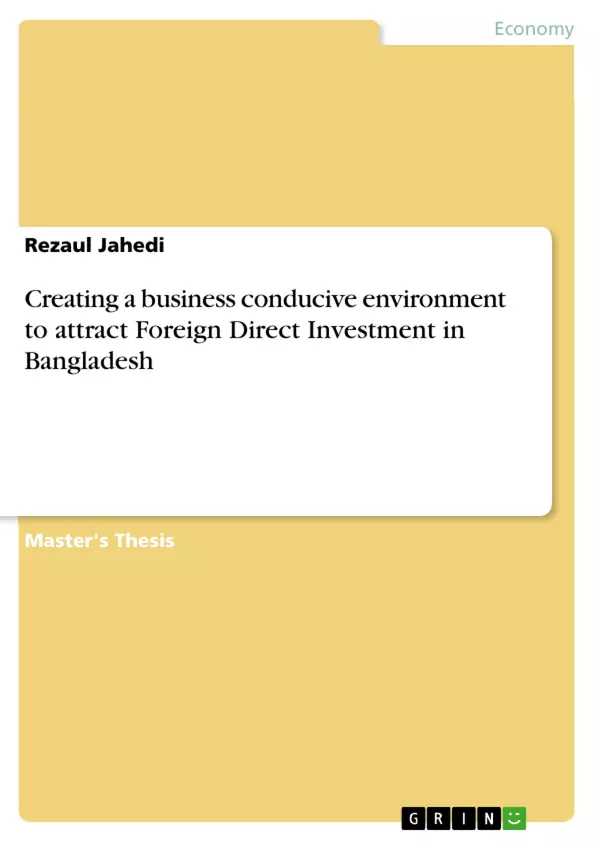Bangladesh is a promising developing nation in South Asia region. Based on the World Bank report, Bangladesh has ranked 122 among 183 countries in 2012 globally in terms of ease of doing business. The present study attempted to investigate the major problems areas which influence FDI inflows in Bangladesh. More importantly, the inflows of FDI in Bangladesh have declined since 2008-09.
This study sought to analyze the current business environment and how to create a congenial climate for attracting FDI in Bangladesh. The study also shows that the declining trend of FDI inflows in Bangladesh is directly corollary of the political situation. For creating a good business environment, Political stability of the host country is the prime determinant for attracting FDI.
Inhaltsverzeichnis (Table of Contents)
- Chapter 1 Introduction
- 1.1 Motivation
- 1.2 Research Questions
- 1.3 Research Methodology
- 1.4 Data Collection Procedures
- 1.5 The time schedule of the research
- Chapter 2 Literature Review:
- 2.1 Key Definitions
- 2.1.1 Foreign Direct Investment (FDI)
- 2.1.2 Business Friendly Environment (Business Climate):
- 2.1.3 Economic Growth
- 2.2 Current Research
- Chapter 3 Theoretical Framework
- Chapter 4 An overview of FDI in Bangladesh
- 4.1 Background
- 4.2 The Position of Bangladesh in South Asian Countries
- 4.3 Foreign Direct Investment Statistics
- 4.4 FDI as a Percentage of GDP
- 4.5 FDI as a Percentage of Total Investment
- 4.6 Ease of Doing Business in Bangladesh
- Chapter 5 Advantages and Disadvantages for Attracting FDI in Bangladesh
- 5.1 Facilities and incentives for foreign investors (BOI, 2012)
- 5.2 Advantages for Attracting FDI in Bangladesh
- 5.3 Disadvantages for Attracting FDI in Bangladesh:
- Chapter 6 Analytical Discussion
- 6.1 Survey Data Analysis and Discussion
- 6.2 Observation and perceptions of the respondents:
- Chapter 7 Conclusion & Recommendations:
Zielsetzung und Themenschwerpunkte (Objectives and Key Themes)
This dissertation explores the factors and strategies that contribute to the creation of a business-conducive environment to attract Foreign Direct Investment (FDI) in Bangladesh. It examines the reasons behind the declining trend of FDI inflow since 2008-09, analyzes the advantages and disadvantages of Bangladesh as an investment destination, and ultimately proposes policy recommendations to improve the investment climate.
- The impact of political stability and unrest on FDI
- The importance of infrastructure and utility services availability
- The role of corruption and bureaucratic burden in hindering FDI
- The effectiveness of government policies and incentives in attracting FDI
- The analysis of the business climate and ease of doing business indicators in Bangladesh
Zusammenfassung der Kapitel (Chapter Summaries)
Chapter 1: Introduction introduces the research topic, providing motivation, research questions, methodology, data collection procedures, and a time schedule.
Chapter 2: Literature Review delves into key definitions of FDI, business environment, and economic growth. It further examines existing research on the determinants of FDI inflow, particularly emphasizing the role of political stability, infrastructure, corruption, and macroeconomic policies.
Chapter 3: Theoretical Framework presents the theoretical lens used for this research – Michael Porter's Diamond Model – analyzing the comparative advantage of nations and its implications for attracting FDI.
Chapter 4: An overview of FDI in Bangladesh presents the FDI scenario in Bangladesh, exploring the country's position within South Asia, reviewing FDI statistics, examining FDI as a percentage of GDP and total investment, and discussing the challenges related to the ease of doing business in Bangladesh.
Chapter 5: Advantages and Disadvantages for Attracting FDI in Bangladesh analyzes the facilities and incentives provided by the government, highlights the country's advantages for attracting FDI, and critically examines the disadvantages that hinder investment.
Schlüsselwörter (Keywords)
The study focuses on key terms and concepts including Foreign Direct Investment (FDI), business environment, congenial climate, political stability, ease of doing business, infrastructure, corruption, government policies, investment incentives, and macroeconomic policies.
Frequently Asked Questions
Why has Foreign Direct Investment (FDI) in Bangladesh declined?
The study shows that the declining trend since 2008-09 is directly linked to the political situation and unrest in the country, which discourages foreign investors.
What is the most important factor for attracting FDI in Bangladesh?
Political stability is identified as the prime determinant for creating a congenial business environment and attracting international capital.
How does Bangladesh rank in terms of "Ease of Doing Business"?
According to a 2012 World Bank report mentioned in the study, Bangladesh ranked 122nd out of 183 countries globally.
What are the main disadvantages of investing in Bangladesh?
Key obstacles include poor infrastructure, limited availability of utility services, corruption, and a heavy bureaucratic burden.
What theoretical framework is used to analyze Bangladesh's competitiveness?
The dissertation uses Michael Porter's Diamond Model to analyze the comparative advantages and disadvantages of the nation in attracting FDI.
What are the facilities provided to foreign investors?
The government, through the Board of Investment (BOI), provides various incentives and facilities, although their effectiveness is often hindered by macroeconomic and political challenges.
- Quote paper
- Rezaul Jahedi (Author), 2013, Creating a business conducive environment to attract Foreign Direct Investment in Bangladesh, Munich, GRIN Verlag, https://www.grin.com/document/322461



